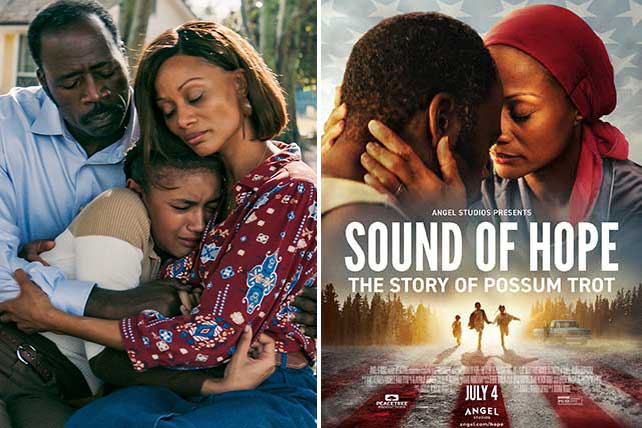Angel Studios‘ new film, “Sound of Hope: The Story of Possum Trot,” which boasts an A+ CinemaScore, took in more than $6.6 million over the Fourth of July weekend.
The film stars Nika King (“Euphoria,” “65”), Demetrius Grosse (“Rampage,” “Fear the Walking Dead”), and Elizabeth Mitchell (“Lost,” “The Expanse”). It was directed by Joshua Weigel, and Letitia Wright (“Black Panther”) served as an executive producer.
“Sound of Hope: The Story of Possum Trot” is inspired by the true story of how Rev. WC Martin and his wife, Donna, inspired their 100-member Bennett Chapel Missionary Baptist Church in rural Possum Trot, Texas, to adopt kids in the local foster care system.
Led by Donna’s ambition to take in foster children no one else would take, her husband charged his congregation to obey God’s command found in James 1:27: “Religion that is pure and undefiled before God the Father is this: to visit orphans and widows in their affliction, and to keep oneself unstained from the world.”
RELATED: ‘God’s Children Are Not for Sale’—Jim Caviezel Says Mel Gibson Wept While Viewing ‘Sound of Freedom’
Throughout the film, Martin says that God never said life would be easy, but the Bible says to “count it all joy when you run into trouble.” He challenged his congregation, many of whom were scraping by to pay the electric and water bills each month, to trust God.
“We fill up church houses like this all over the place every Sunday, and we praise Jesus in them and we praise the Lord,” Martin preaches. “But if we can’t wrap our arms around the most vulnerable amongst us, then what do we have?” Martin walks over to the drum and starts to beat the cymbal with his hand. “Noise! Noise! Noise! Noise! Noise,” he says. “That’s what we have. Noise! And the children can’t take the noise anymore.”
Today, over 400,000 children are in the foster system. Over 100,000 are waiting to be adopted.
Martin’s challenge, which started in 1996, resulted in 22 families adopting 77 children, proving that no matter the size of a church or the economic status of its people, the battle for America’s most vulnerable can be won.
According to the film, the adopted children are now grown, have become high school and college graduates, remain friends, and “many of them have become mothers and fathers themselves.”

